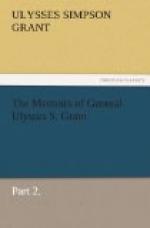As the time for the Presidential election of 1856—the first at which I had the opportunity of voting—approached, party feeling began to run high. The Republican party was regarded in the South and the border States not only as opposed to the extension of slavery, but as favoring the compulsory abolition of the institution without compensation to the owners. The most horrible visions seemed to present themselves to the minds of people who, one would suppose, ought to have known better. Many educated and, otherwise, sensible persons appeared to believe that emancipation meant social equality. Treason to the Government was openly advocated and was not rebuked. It was evident to my mind that the election of a Republican President in 1856 meant the secession of all the Slave States, and rebellion. Under these circumstances I preferred the success of a candidate whose election would prevent or postpone secession, to seeing the country plunged into a war the end of which no man could foretell. With a Democrat elected by the unanimous vote of the Slave States, there could be no pretext for secession for four years. I very much hoped that the passions of the people would subside in that time, and the catastrophe be averted altogether; if it was not, I believed the country would be better prepared to receive the shock and to resist it. I therefore voted for James Buchanan for President. Four years later the Republican party was successful in electing its candidate to the Presidency. The civilized world has learned the consequence. Four millions of human beings held as chattels have been liberated; the ballot has been given to them; the free schools of the country have been opened to their children. The nation still lives, and the people are just as free to avoid social intimacy with the blacks as ever they were, or as they are with white people.
While living in Galena I was nominally only a clerk supporting myself and family on a stipulated salary. In reality my position was different. My father had never lived in Galena himself, but had established my two brothers there, the one next younger than myself in charge of the business, assisted by the youngest. When I went there it was my father’s intention to give up all connection with the business himself, and to establish his three sons in it: but the brother who had really built up the business was sinking with consumption, and it was not thought best to make any change while he was in this condition. He lived until September, 1861, when he succumbed to that insidious disease which always flatters its victims into the belief that they are growing better up to the close of life. A more honorable man never transacted business. In September, 1861, I was engaged in an employment which required all my attention elsewhere.




